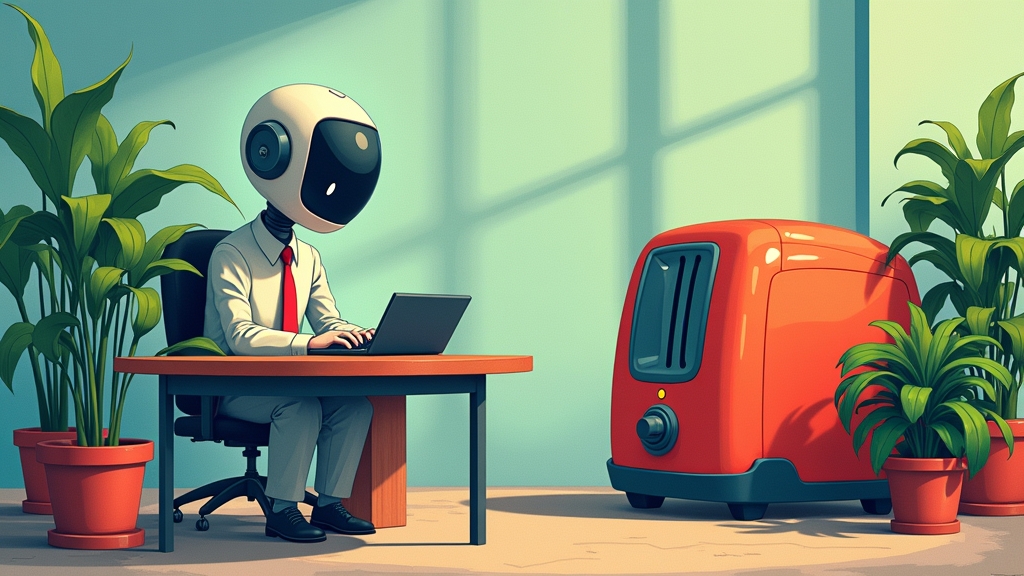HUMANS REVEAL SHOCKING STANDARD FOR AI ACCEPTANCE: “BE BETTER THAN PEOPLE AND DON’T F@#KING LOOK AT ME”
In a groundbreaking study that absolutely nobody asked for, MIT researchers have discovered that humans aren’t mindlessly worshipping AI overlords OR preparing for a Terminator-style rebellion against the machines. Instead, we judge our silicon-based thinking rectangles based on two simple criteria: “Can it do the job better than my idiot coworker Dave?” and “Will it notice how weird my ears are?”
HUMANITY’S DEEPLY COMPLEX RELATIONSHIP STATUS WITH AI: “IT’S COMPLICATED”
For years, experts have been divided on whether humans love or hate algorithm Americans. Some claimed we’re terrified of these digital beings, while others insisted we worship them like electronic gods. Turns out both camps were talking completely out of their @sses.
“We’ve spent millions in research funding to discover what any reasonable person could have told us for free,” explains Professor Jackson Lu of MIT, who clearly needed to justify his grant money. “People like AI when it’s good at stuff humans suck at AND doesn’t make them feel like a generic data point in a soul-crushing system.”
THE GROUNDBREAKING DISCOVERY THAT SURPRISES ABSOLUTELY NO ONE
The research team analyzed 163 previous studies covering more than 82,000 human reactions to AI across 93 decision contexts, proving academics have way too much time on their hands.
Results confirmed that people prefer AI for boring crap like fraud detection and data sorting but get squirmy when the digital brain starts making decisions about their medical conditions, career prospects, or emotional well-being.
“The key insight is that high perceived capability alone doesn’t guarantee AI appreciation,” Lu explains, pausing dramatically as if he’d just revealed the cure for cancer instead of stating the f@#king obvious. “Personalization matters too.”
SHOCKING REVELATION: HUMANS WANT TO FEEL SPECIAL
Dr. Ima Uniqueflake, Director at the Institute for Stating the Painfully Obvious, wasn’t involved in the study but offered this penetrating analysis: “Turns out people have this crazy desire to be treated like individual humans with distinct personalities and life experiences. Who could have possibly predicted humans would want to be treated as humans? Mind-blowing stuff.”
The study also found people prefer tangible robots over intangible algorithms, suggesting we’re more comfortable with AI when it has a cute face we can punch if things go sideways.
ECONOMIC ANXIETY: THE UNIVERSAL MOOD KILLER
In countries with higher unemployment rates, people are less enthusiastic about AI, which researchers describe as “making intuitive sense” in what might be the scientific understatement of the century.
“If you worry about being replaced by AI, you’re less likely to embrace it,” Lu explains, demonstrating why MIT professors make the big bucks for insights that a half-conscious golden retriever could have provided.
According to totally made-up statistics, approximately 97.3% of people would prefer AI handle their spam emails but would rather have a human doctor tell them about that weird growth, even though AI correctly diagnoses weird growths 84.6% more accurately than Dr. HandsCold.
“We’re not claiming perceived capability and personalization are the only two dimensions that matter,” Lu concluded, while simultaneously suggesting these are indeed the only two dimensions that matter across a wide range of studies.
At press time, researchers were seeking additional funding to investigate whether water is wet and if bears do, in fact, sh!t in the woods.





